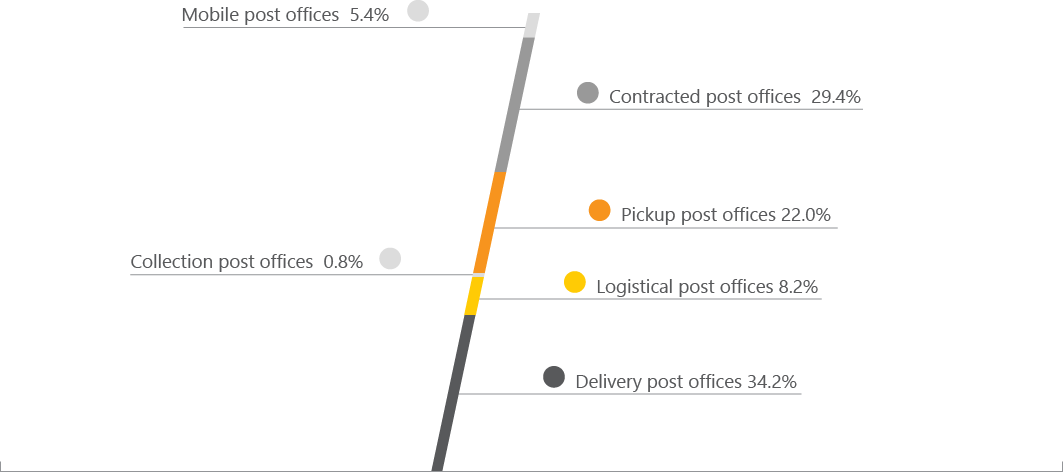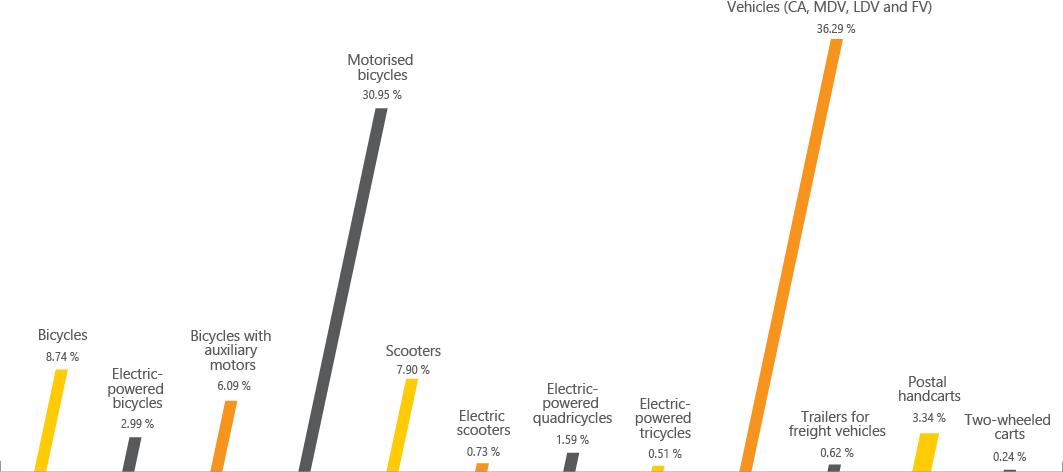2.5 POSTAL NETWORK AND TRANSPORTATION EQUIPMENT
OF POŠTA SLOVENIJE
2.5.1 Postal network of Pošta Slovenije
Post offices and logistics centres
The postal network comprised 487 contact points taking various organisational forms at the end of 2020, ranking Pošta Slovenije among the EU countries with the highest level of accessibility to the postal network by users.
In 2020 we transformed 16 post offices into contracted post offices, and did not close any post office as part of the optimisation of the postal network, the aim of which is to establish a network that will facilitate the long-term stability and success of the Company’s operations, taking into account major structural changes on the postal services market. The postal network thus comprised 206 post offices that provide delivery services (166 delivery post offices and 40 logistical post offices), four collection post offices, 107 pickup post offices, 143 contracted post offices and 26 mobile post offices. In addition to the organisational forms described above, the postal network also comprises two mail sorting and logistics centres, 52 letter-carrier post offices and one delivery point, as well as alternative delivery and pickup points (at 114 Petrol service stations, 41 MOL service stations, one self-service post office, two self-service PS 24/7 outlets, 24 automated parcel machines and 450 Direct4me parcel delivery boxes).
Graph 2: Breakdown of contact points
Density of the public postal network
The average post office (including delivery post offices, logistical post offices, collection post offices, pickup post offices and contracted post offices) covered 42 km2 and 1,637 households in 2020.
Frequency of delivery
In 2020 a total of 50% of households were covered by a six-day per week delivery service. A total of 0.15% of households received mail items via central delivery points.
2.5.2 Postal network devices and transportation equipment of Pošta Slovenije
Pošta Slovenije has different devices and mobile and other equipment available to it, which are interconnected into a single technical and technological unit that it uses for the provision of postal services. Postmen (letter carriers) thus have 2,703 delivery depots available to them in the field to store postal items for delivery, allocating and arranging postal items by address in 1,988 carrying bags, and activating 3,484 mobile devices for the delivery and handover of mail. Users have 1,683 post boxes for depositing (posting) mail items, 11,547 PO boxes for the collection of mail at post offices that are used by 25,928 addressees (multiple addressees use the same PO box), 6,428 contracting parties use different online services and the eSpremnica application for the labelling of shipments (preparation of the address label for shipment, including all the attributes for delivery at the post office), and the submission of electronic data on the shipment to the post office that performs the acceptance/receipt of the shipments. Items are folded, separated and routed using 31 machines.
The Company uses various transportation means for external and internal transport. It has 11,497 transportation vehicles (such as transportation carts and forklifts) for internal transportation purposes and 3,585 vehicles for external transport purposes (cars, three- and four-wheeled vehicles, mopeds and scooters, bicycles and handcarts).

Graph 3: Types of external transportation equipment
Note: CA (cars), LDV (light delivery vehicles), MDV (medium-sized delivery vehicles) and FV (freight vehicles).
Equipment and technologies
In 2020 we carried out a number of activities connected with the introduction of new technologies to the work process and associated with upgrades to existing devices; either for ensuring continuous operation or new functionalities.
We prepared and published a public contract for the purchase, implementation and maintenance of the Loose Items Sorting Machine (LISM), which will enable the Company to automate the sorting of postal items from Asian markets and large domestic shipments.
We replaced the obsolete (worn-out) RFID antennas with new generation RTLS antennas at both mail sorting and logistics centres, thereby extending the service life of the entire system, optimising maintenance and preparing the bases for the expansion of the RFID network to other Pošta Slovenije locations. This is the basis for putting a system in place for the automatic tracking of own logistical equipment within the postal and logistics network, which is planned in the period 2021 to 2023.
We tested new wireless readers that operators fit on the backside of a hand, which enables both their hands to be free for work. This has brought satisfactory results, so as of 2021 we plan to gradually introduce these new technologies into the mail sorting and logistics process (initially in limited quantities).
In the scope of the Deminimis project we defined the process and prepared and successfully executed a public contract for the implementation of a new technology (MICS workstations – Manual Image Capturing Station), which will contribute significantly to the implementation of the EU Directive, which as of 1 July 2021 envisages customs clearance for all shipments from third countries valued over EUR 0 (currently only shipments valued above EUR 22 are subject to customs clearance). By using OCR technology and artificial intelligence (AI) MICS tables will be able to recognise all the data required to ensure automatic customs clearance for these shipments.
A project is currently underway to upgrade automated flats sorters (AFS), which will help us significantly reduce the risk of system outage as well as extend the system’s service life by an additional five years. We will also obtain the most state-of-the-art software solutions, improve the system’s efficiency (performance) and gain certain new functionalities.
We began a project to upgrade the DWS system, which enables the automatic receipt of parcels at the Ljubljana MSLC. We introduced the system in 2019, which we are now upgrading to speed it up and make it more efficient.
We carried out activities to upgrade the parcel sorter at the Maribor MSLC, where we plan to replace the Interbus communication network with the Profibus network. This replacement will significantly mitigate the risk associated with the obsoleteness of the parcel sorter and thus any problems associated with its maintenance. This will enable us to prevent outages of the parcel sorter to a large extent due to maintenance inability and thus prevent potential collapses when processing postal items at the Maribor MSLC,
We have initiated activities for the relocation of line devices for folding unaddressed direct mail to the location of the parcel forwarding unit within the Maribor MSLC. This activity will help us gain the required space for the management of parcel sorting. The planned activity is also a prerequisite for the subsequent replacement of the parcel sorter, and also a prerequisite for the management of logistic processes during the construction of the logistics hall at the Maribor MSLC.
2.5.3 Security within the Pošta Slovenije Group
Pošta Slovenije continuously implements activities in the area of corporate security, and updates and upgrades those activities based on security assessments and assessments of the risk of the occurrence of loss events. Activities that we implemented to that end included physical, technical and mechanical security measures, as well as organisational and personnel measures through which we strive to manage security threats to the greatest extent possible. In terms of advising subsidiaries, we were actively involved in the management of security issues at those companies. We also advised and offered assistance to subsidiaries in the selection and implementation of appropriate security measures and solutions, taking into account the corporate security standards and measures of the controlling company.

Pošta Slovenije adopted a new umbrella security policy, which serves as an internal act that demonstrates the importance of corporate security in achieving business objectives, where specific aspects of the security policy are also applied accordingly at Pošta Slovenije Group companies. Minimum security standards and guidelines ensuring the security of people and assets at Pošta Slovenije, which in formal terms serve as guidelines for ensuring a minimum level of protection for people and assets, were also adopted.
An important aspect of the effective management of security risks is also responsibility for raising proper awareness and for appropriate employee qualifications (training) to identify potential security risks, and for appropriate conduct in these cases. In addition to security-related training for new hires we carried out e-training courses for employees working at counters focusing on content relating to the protection of people and assets, information security and personal data protection. In terms of the protection of people and assets and information security, we also carried out preventive integrity tests to verify whether employees are able to recognise various security risks to which they are potentially exposed on a daily basis, and whether they know how to act accordingly.
The number of criminal acts by third parties recorded in 2020 was the lowest number relative to the figures recorded in previous years. Those acts pose a threat to the security of people and Pošta Slovenije’s assets. The number of severe forms of criminal acts by third parties (robberies) in 2020 was at its lowest level relative to previous years, while criminal acts committed by Pošta Slovenije employees and contracted service providers were at the level of previous years. The majority of those acts involved punishable acts of theft, fraud, embezzlement, the unauthorised use of foreign assets and breaches of confidentiality. In addition we also handled cases of published false emails of third parties, who with the intention of misleading and deceiving customers also abused Pošta Slovenije’s corporate image to make the recipients of these emails pay for a service that never existed, enabling the senders of these false emails to gain a material benefit from the deceived customers. In addition to investigating authorities, we also engaged Si-CERT into the investigation of these cases, and via the relevant publications on social networks and media we ensured the public was properly informed about these attempts of fraud.
All these cases of criminal acts resulted in property damage to Pošta Slovenije, but those acts had no serious consequences for the lives and health of the Company’s employees and customers. Professional psychosocial assistance is offered to employees involved in robberies.
The corporate security system is fulfilling its mission, as we are able to manage security risks and the consequences thereof through implemented security measures. Pošta Slovenije will continue to strive for the appropriate level of security for people and assets, and thus a stable and safe work environment. To that end, we will make an effort in the future to apply a uniform security policy and standards at the level of the entire Pošta Slovenije Group.